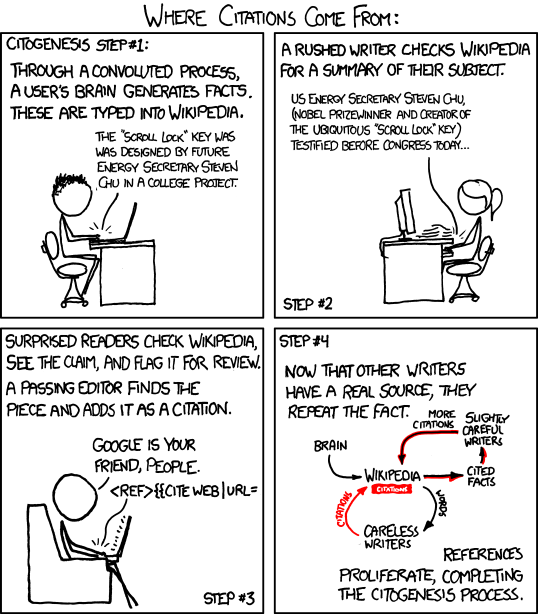This comic is calling into question the reliability of Wikipedia. This is a favorite pastime of librarians, teachers, and professional researchers, and not usually one of Randall's. Wikipedia is a free and freely editable encyclopedia that aims to become a comprehensive, neutral compilation of verifiable and established facts. Wikipedia aims to provide only facts backed by reliable sources. However, this comic strip details a process in which Wikipedia can not only spread misinformation but make said misinformation seem reliable through a process of "circular reporting".
The title of the comic is similar to the word cytogenesis. Cytogenesis is the formation of cells and their development. Citogenesis, on the other hand, is a portmanteau of 'Citation' and 'Genesis'. A citation is a reference to a source, used to back up a specific claim, and genesis means the origin or creation of something. By extension, citogenesis is the creation of text in a reliable source that can be cited to back up a claim.
In the process described here, someone adds an untrue, but plausible-sounding claim to an article in Wikipedia. A writer for some publication sees the information on Wikipedia and adds it to an article, without bothering to check the sources. The strip describes the writer as "rushed", and in this example, the information likely seems of small enough consequence that she may not have considered that someone might have made it up. Eventually, someone notices the claim in the published source and cites it in the Wikipedia article. The citation now gives the claim credence, as readers don't realize that the official source was based on the Wikipedia article. Thanks to this citation, other reporters, slightly more cautious than the first, consider this bit of information to be reliable and then cite it in articles of their own. Those articles then get cited in Wikipedia, making the claim seem more reliable, encouraging even more reporters (and possibly reporters from more reputable outlets) to believe it and repeat the claim. Eventually, a lengthy list of citations is available, giving an impression of consensus, even though all of it originated with a single article, which was based on an uncited Wikipedia edit.
Four years before, Randall commented on Wikipedia about that process happening to him (on a minor detail), which probably indicates the inception of this comic:
I've never referred to the boy in the barrel as "Barrel Lad" -- that seems to have started in this [Wikipedia] article. I've called him "Barrel boy" or "The boy in the barrel". Minor detail, but it's funny how sometimes something can appear on Wikipedia, get referenced in other places, and then Wikipedia cites those other places as supporting references. Hooray Wikiality!
In turn, Randall originated the untrue assertion in this comic that Steven Chu, a physicist, and at the time of the strip the U.S. Secretary of Energy, invented the Scroll lock key, a common button on computer keyboards. Since most people are aware of the scroll lock key but know little about its function or origins, this false information would make for an interesting piece of trivia that would likely spread very quickly.
Following this comic, the actual Scroll Lock and Steven Chu articles were both vandalized by "helpful" editors trying to project Randall's reality on Wikipedia. As of May 2022, the Wikipedia article on Citogenesis redirects to the "Circular reporting on Wikipedia" section on the article "Circular reporting". The section credits the term "citogenesis" to Randall Munroe, with a citation linking to this comic. To make matters even more surreal, a Wikipedia editor once flagged the link to this xkcd comic as "Dubious - The material near this tag is possibly inaccurate or non-factual."!
We haven't seen a book like the one Randall describes in the title text, but one example of the misuse of Wikipedia by "reliable sources" concerns the former German minister Karl-Theodor zu Guttenberg. His complete name contains fifteen names/words and reads: Karl-Theodor Maria Nikolaus Johann Jacob Philipp Franz Joseph Sylvester Freiherr von und zu Guttenberg. An anonymous user added one more ("Wilhelm") to the German Wikipedia, just the evening before Karl-Theodor zu Guttenberg was presented as the new Federal Minister of Economics and Technology on February 10, 2009. The next day many major German newspapers published this wrong name (translation of bildblog.de).
